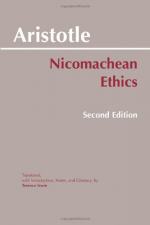
|
| Name: _________________________ | Period: ___________________ |
This test consists of 5 multiple choice questions, 5 short answer questions, and 10 short essay questions.
Multiple Choice Questions
1. To whose undemonstrated statements and opinions ought people pay attention, according to Aristotle?
(a) The teachers of the youth.
(b) The wise and powerful.
(c) The experienced and elderly.
(d) The quick-witted and youthful.
2. With what virtue does Aristotle credit Eudoxus in X.2?
(a) Temperance.
(b) Courage.
(c) Justice.
(d) Wisdom.
3. With what is the second part of the reasoning part of the soul concerned in the view of Aristotle?
(a) Things that can be other than they are.
(b) Things that can never be.
(c) Things that cannot be other than they are.
(d) Things that might be but are not at all.
4. For what sort of living environment does Aristotle say the human being is meant in IX.9?
(a) Urban.
(b) Suburban.
(c) Nomadic.
(d) Rural.
5. How many senses of the word "good" does Aristotle discuss in VII.12?
(a) Seven.
(b) Eight.
(c) Six.
(d) Two.
Short Answer Questions
1. Aristotle compares the relationship between spiritedness and reason to the relationship between what?
2. Deliberation, as Aristotle states in VI.9, is a kind of what?
3. Which power of the soul does Aristotle describe in VI.11 as being concerned with both the beginning and the end?
4. Which of the following intellectual virtues does Aristotle say the incontinent person cannot have, at the beginning of VII.10?
5. In what way does Aristotle claim the incontinent person is unlike the vicious?
Short Essay Questions
1. What is one reason Aristotle gives for which someone ought not to treat former friends in some way different than strangers if the friendship was dissolved to to an excess of vice?
2. Why does Aristotle state that mothers have greater love for their children than children for their parents?
3. What is the significance of Aristotle saying that the active conditions of the soul that are the intellectual virtues produce something, not as medicine produces health, but as health produces health?
4. In what way does Aristotle agree with Socrates concerning knowledge and moral action?
5. What is the Aristotelian relationship between happiness, the gods, human beings, and animals, as discussed in X.8?
6. For Aristotle, in what way is a neutral or idle state detrimental to many individuals' moral character?
7. Through the possession of what virtue, according to Aristotle, is man said to have possession of all the intellectual virtues, at least to some degree, and why?
8. Explain the three sorts of friendship described in Book VIII.
9. Give an example of something affirmed by knowledge, as that which cannot be otherwise than it is.
10. Why do friendships of utility quickly come about and subsequently dissolve, according to Aristotle?
|
This section contains 1,051 words (approx. 4 pages at 300 words per page) |

|




